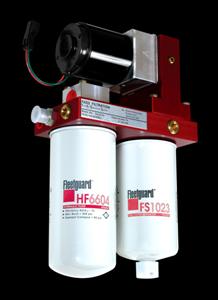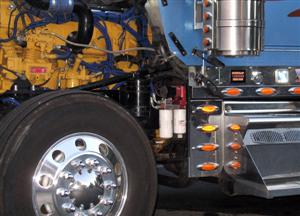OCTOBER 2007 TRUCKER
TALK
THE FIGHT FOR
EFFICIENCY
By Writers and Owner
Operators Rod & Kim Grimm
With the price of crude oil hitting $80 a barrel, the big oil boys must be dancing in their offices. And now with hurricane season getting started and winter coming, the demand for all types of fuel will push prices even higher. Those oil tycoons will use any excuse to raise the price of diesel, and we sure wouldn’t want them to run out of “excuses” to make over 10 BILLION dollars of profit every quarter! So anytime we can find products that help improve our fuel mileage, we need to take advantage of them. If we can buy less fuel, maybe we can cut into the big boy’s profits just a little – and maybe we could even put a few dollars back in our own pocket.
It’s really sad that most people complain about the high price of gasoline, but they don’t realize that they are paying for the higher price of diesel as well. If we didn’t have fuel surcharges, no trucking company out here could survive the increased cost of fuel. The fuel surcharges are based on $1.25 per gallon fuel, a number we could see triple in the near future. Everybody pays for what it costs to get goods to market, but truckers get to pay for it twice (once at the pump and then in the stores again).
In March at the truck show in Louisville, KY we found the FASS Fuel System. Talking with Brad Ekstam, the creator of the product, he told us how the system works and it made sense. FASS stands for Fuel Air Separation System, and that is exactly what this product does. It removes air from the fuel and keeps the fuel pressure to the engine constant. By removing the air from the fuel, the FASS system enables the engine to run smoother and with more response. As a result, increases in power and fuel mileage are achieved. Another benefit of the FASS system is the fact that it also helps lower both carbon dioxide and carbon monoxide emissions.
 Why
do we need a product like this? The engineers at Caterpillar and Cummins
have said that normal No. 2 Diesel Fuel contains between 3% and 10% air.
When the air gets to the nozzle or injector, it must be compressed before
the fuel is injected, thus delaying the firing or timing. Realizing that
all of the injectors are getting some air and that it’s impossible to
determine how much air is going to each injector, the firing of the injectors
is not precise. This causes the engine to run rough (air can cause vibrations)
and wears out the fuel system sooner because of the cavitations in the
pump and injectors. Air in fuel can also cause excessive smoke, engine
surges at low idle, misfires and lowered horsepower and efficiency.
Why
do we need a product like this? The engineers at Caterpillar and Cummins
have said that normal No. 2 Diesel Fuel contains between 3% and 10% air.
When the air gets to the nozzle or injector, it must be compressed before
the fuel is injected, thus delaying the firing or timing. Realizing that
all of the injectors are getting some air and that it’s impossible to
determine how much air is going to each injector, the firing of the injectors
is not precise. This causes the engine to run rough (air can cause vibrations)
and wears out the fuel system sooner because of the cavitations in the
pump and injectors. Air in fuel can also cause excessive smoke, engine
surges at low idle, misfires and lowered horsepower and efficiency.
When manufacturers test their engines in the factory, they utilize optimal engine conditions. Optimal engine conditions equal optimal engine performance. Makes sense, right? Well, the way they do it is nothing like the real world. The fuel tank delivering the fuel to the engine is up to ten feet or more above the engine and the fuel returns to a different tank below. This is nothing like the way it works on our trucks, where the fuel is drawn and returned to the same tank, allowing air to build up in the lines. And when was the last time you saw a truck’s fuel tank ten feet above the engine? By taking the air out of the lines, the FASS system helps achieve a more optimal engine condition. This not only improves the mileage, but the power as well! On another note, the new ultra low sulfur fuel has a lower BTU so it doesn’t produce as much power as the old fuel did – the FASS system will also help you to gain some of that lost power back.
The FASS system was on display at Brad’s booth in Kentucky where he gave us a demonstration on how it works. We were impressed, so we got one. Later, when we were in Cedar Rapids at Altorfer Cat, we noticed that they had a FASS system on their heavy haul truck. We had not installed our system yet, so we were anxious to get their opinion. The driver was very impressed with the difference it had made right away. He told us that the response was much better – it no longer had the lag it had before. Another one of their customers put one on his new 625 Caterpillar and would not take it off. He even had a special stainless steel bracket made for it. The FASS system really seems to help the new engines. Our old engine doesn’t have the lag time the new ones do, but if you can make the new ones as good as the old ones and make the old ones even better, it’s a great thing! Needless to say, we were excited to install our system.
Having had the system on our truck for six months now, we know that the improvement we saw in the beginning has lasted. It has improved our fuel mileage .3 to .5 mpg and our power has increased 1 gear and 5 mph pulling the mountains. We run the same routes, loaded close to the same weights, every week, so it was easy to track the improvement. Our truck used to get 7 mpg on a regular basis when we pulled lighter loads over flat terrain, but now we run hard and heavy in the mountains. Lately, if we can get 5 to 6 mpg out of our old girl we are pretty happy. A really good tailwind is the only way we can do better than 6 mpg. In the right (or should I say wrong) conditions, we have gotten down into the 3.5 mpg neighborhood when 40 mph winds are blowing across Wyoming. Since we installed the FASS system, we haven’t been under 4.5 (which may sound awful to some, but it sounds good to us, compared to before). Just imagine what this system could do in a truck that is more aerodynamic – and if you do all those other things, like pull light loads, drive slowly and use an auxiliary power unit (APU) instead of idling – the increase in your truck’s fuel efficiency could be phenomenal!
 To
get more information on the FASS Fuel System, call 1-866-POWER-HP or visit
www.fassride.com. While on their
website, you can also find the dealer nearest to you that sells the product.
The price is around $550 to $650 depending on your make and model of engine.
They also have FASS systems for diesel pickups, so you might want to check
into getting one for your little truck, too.
To
get more information on the FASS Fuel System, call 1-866-POWER-HP or visit
www.fassride.com. While on their
website, you can also find the dealer nearest to you that sells the product.
The price is around $550 to $650 depending on your make and model of engine.
They also have FASS systems for diesel pickups, so you might want to check
into getting one for your little truck, too.
Any way we can save money (and fuel) is a good thing. Even the big companies are realizing the benefits of having an APU on their trucks. IdleAire is in some truck stops, providing shore power for your truck instead of idling, but they only provide a limited number of spaces and you have to pay per hour to use it. An APU can be used anywhere the truck is, and after the fuel savings has paid for it, it’s almost like it starts paying you to have it. Before getting an APU on our truck, we had 37% idle time on our big yellow engine. We’ve had our RigMaster APU for four years now, so that too has paid for itself! Our Cat ID says our idle time is 33% now, which doesn’t sound like much of a drop, but it has to make up for the five years before we got it.
Who knows what bright ideas CARB might come up with next? I heard on a trucking radio show that they are now concerned about cow’s farts creating too much greenhouse gases. I wonder how that regulation might read! I wouldn’t want to be the one that has to install that particulate filter or EGR valve. Do you think the government would subsidize that requirement? If you are looking to get out of trucking, this could be your big ticket. If you could invent that product and get a patent, you might do alright. Or maybe we should plant more trees – they absorb carbon dioxide and then release oxygen – but that would be too easy.
The manufacturers should focus on making our engines more fuel efficient, instead of focusing on making them cleaner. A cleaner engine is good, but it still burns a lot of diesel fuel. Some of the newer engines have sacrificed some efficiency to run cleaner, but if it takes more fuel to get where you are going, doesn’t that sort of undo any good you may have done. The old engines, when you drive them right, get better fuel mileage than the new engines. Burning more diesel fuel is not the answer to cleaner air – it just makes those oil boys even richer at our expense.
Until things change, all we can do is keep looking for new products that help us gain back some of what we are losing as all these new rules and regulations come down the pike. The FASS Fuel System is one of those products. And we recommend it highly.
Copyright
© 2006 10-4 Magazine and Tenfourmagazine.com
PO Box 7377 Huntington Beach, CA, 92615 tel. (714) 378-9990 fax
(714) 962-8506

